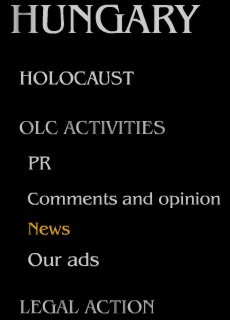|
MARK COLVIN: A Perth man appeared
in the Federal Court today to argue against his extradition
to Hungary to face trial on a war crime charge.
Hungarian authorities want Charles Zentai to answer allegations that he assaulted
and killed a Jewish man in Budapest during the Second World
War. Mr Zentai has declared his innocence, but fears he won't
get a fair trial if he's extradited to Hungary.
Today was the latest in a series of
court appearances where his lawyers have been trying to use
points of extradition law to make their case.
David Weber reports.
DAVID WEBER: Mr Zentai recently undertook
a lie-detector test. The analyst who conducted it said he
passed with flying colours. Today, Mr Zentai was asked whether
he found it hard to take the test.
CHARLES ZENTAI: Emotionally, or psychologically,
it wasn't hard at all, because I had nothing to hide. Physically
it was a little bit, because of all the pressure on my arms
and all that, but no, it was acceptable. I was prepared to
do it anyhow, whatever the discomfort was…
REPORTER: Do you have a message for
the Australian people, for the Federal Government?
CHARLES ZENTAI: I just want justice,
that's all.
DAVID WEBER: Mr Zentai is not able
to present his own evidence against the murder claim in an
Australian court. The role of the Australian court system
is only to determine whether an extradition request has been
properly made.
It's the responsibility of the Federal
Attorney General or the Home Affairs Minister to make the
final decision on extradition. Mr Zentai's son, Ernie Steiner,
said the family has had to fight extradition on complex legal
issues.
ERNIE STEINER: It is very frustrating,
yes, but it's the only avenue that is available. But as I
said before I am preparing submissions to do with the criminal
charges that can be submitted to the Minister for Home Affairs
and also the Attorney General.
And that is a very long document,
and full of statements, and ah, things about history that
show the conduct of the people's court back in the, after
World War II.
DAVID WEBER: The former diplomat Fergus
Hanson recently completed a policy brief for the Lowy Institute
on suspected war criminals in Australia. Mr Hanson says it
will be a landmark case if Mr Zentai is eventually extradited.
FERGUS HANSON: If he is extradited
it will be the very first extradition from Australia of a
suspected war criminal to face trial overseas. So having
said that, it's a very difficult case, and probably not the
strongest case that we've ever had of a suspected war criminal
in Australia.
If, in reading the reports, it seems
as though most, if not all of the witnesses to the murder
have actually since have now died, which would make it a
very difficult case to run successfully, and also probably
impossible in the Australian court.
DAVID WEBER: Mr Hanson says Australia
can take no credit from the way the Zentai case has been
handled.
FERGUS HANSON: Well I think it sends
the unfortunate message that really you've got quite a good
chance of escaping trial, that the fact that we're only sort
of looking to this issue decades after the alleged events
occurred really suggests that there is no dedicated resources
in Australia to look into these issues.
The way that this case came up, we've
got a referral from an organisation in Israel and America
referring information on to the Australian Government, to
the Hungarian Government. So it really doesn't speak very
well about the action that the Government takes against suspects.
DAVID WEBER: Mr Hanson says he's optimistic
the Government will boost resources devoted to dealing with
suspected war criminals from more recent conflicts.
MARK COLVIN: David Weber.
abc.net.au
|


